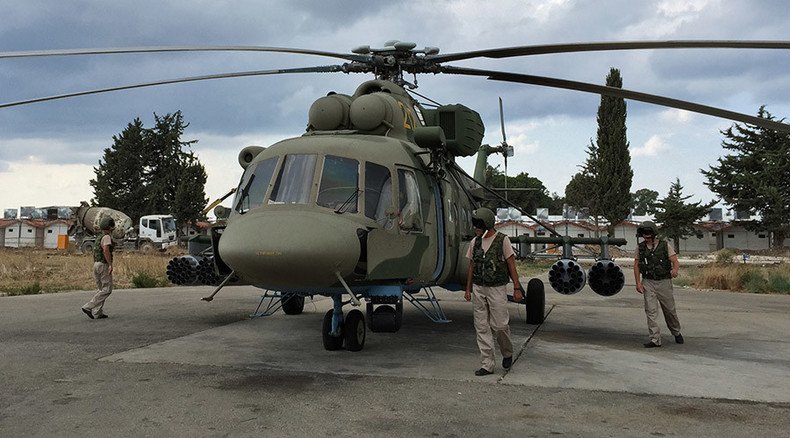‘Any air campaign in Syria needs to involve ground troops and Assad’

The US’s failed aerial campaign has shown that air power alone is not enough to beat Islamic State terrorists, geopolitical analyst Eric Draitser told RT. Any such campaign will require ground troops and cooperation with the Syrian government, he said.
RT: As we were just hearing, the Russian military has said it will not target civilian areas and mosques – how much of a setback are these new ISIS tactics for the Russian campaign?
Eric Draitser: Well, it’s certainly a complication, but I wouldn’t call it a setback, because naturally the Russian military planners and strategic analysts understood that this is precisely what would happen after the Russian bombing campaign began. They understood that the Islamic State terrorists would move their heavy weapons, would move some of their material into these populated areas, using human shields. This was well understood. But I think there is another angle to this that needs to be examined. Namely, this is the vindication of what President Putin said at the United Nations and what he said repeatedly in his public statements, namely, that no air campaign is going to be successful unless it is done in collaboration with the Syrian government. Namely, that there is a ground force that is going to be able to take on these terrorists who are going to do precisely what we’ve seen this footage showing them do. And this is really the only way to achieve any kind of success on the ground in Syria. Airstrikes are all well and good. They can do a tremendous amount of damage. They can disrupt and destroy a lot of the terrorists’ infrastructure, but when it comes to pinpoint targeting, precisely in these populated areas, this is going to require ground troops. And that’s where the Syrian Arab Army, perhaps also the Hezbollah forces, the others that are on the ground in Syria, where will use their partnership with Russia in order to actually achieve these objectives. And I think that in many ways, it needs to be understood as a major turning point here because the combination of airpower and ground forces is really what it’s going to take to wipe out Islamic State in Syria, as well as in Iraq.
RT:We know that Russia works in close cooperation with the Syrian government, using its intelligence gathering. How helpful is something like this in situations where terrorists hide themselves among civilians?
ED: Well, it’s absolutely essential. In order to be able to rule out the terrorists who are doing this, you’re going to need to have both on-the-ground intelligence and on-the-ground forces. And I think that any military analyst, tactician, strategist can tell you that the United States has learned through, unfortunately, many examples of trial and error in various wars that it has waged, that terrorism and terrorists’ tactics such as these are almost impossible for a traditional military that has overwhelming air power, but is unwilling to engage on the ground. We saw this in Iraq, we’ve seen it in Afghanistan. We’ve seen it elsewhere. The Soviets understood that perfectly in Afghanistan in the 1980s as well. As I said, I don’t think that this is anything unexpected, but it does point to this important aspect of the failure and hollowness of Western policy, when they say they are not willing to collaborate with Assad. It makes the strategy against ISIS absolutely untenable and impossible.
RT:Islamic State is clearly concerned about its image; they heavily use social media and propaganda videos to win over new recruits – that’s not new. But surely tactics like what they’re doing now will make it more difficult for them to do that?
ED: Well, not necessarily, because I don’t think that anybody who’s interested in being recruited by Islamic State is going to be too concerned about ISIS playing dirty. I think what this does illustrate, though, is a level of desperation on the part of ISIS that we have not seen to this point. After a full year of a so-called US air campaign against ISIS, they are operating out in the open – they’re moving convoys, taking Ramadi, taking Mosul in Iraq, operating out in the open, and within a few days they’re scurrying from Russian airstrikes. This is not too chest-bumping, chest-thumping for the Russian side, [but] what this illustrates is the difference it tactics between what Russia has done and what the United States has done. And I think this is critical, because when ISIS tries to recruit new fighters, they are recruiting new fighters A) in this fictional war against the United States and B) in the context of a real war that is now that is decimating them. This is what’s going to prevent new recruits from coming – the fact that they’re not going to operate out in the open, the fact that they are likely to be targeted by overwhelming air capability and ground forces. Ultimately, those in Europe, and in the West and in the Middle East region in general, are going to be dissuaded from joining up with Islamic State because they will fear for their lives. An effective war is going to be the prime example of what’s going to dissuade them.
LISTEN MORE:
The statements, views and opinions expressed in this column are solely those of the author and do not necessarily represent those of RT.












